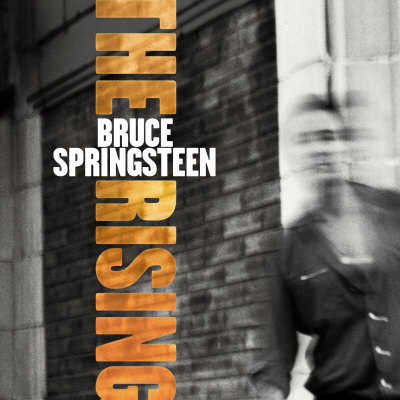
The Rising (2002)

1. Lonesome Day
2. Into the Fire
3. Waitin' on a Sunny Day
4. Nothing Man
5. Counting on a Miracle
6. Empty Sky
7. Worlds Apart
8. Let's Be Friends (Skin to Skin)
9. Further On (Up the Road)
10.The Fuse
11.Mary's Place
12.You're Missing
13.The Rising
14.Paradise
15.My City of Ruins
In the immediate aftermath of September 11th, the cultural response in America was, perhaps inevitably, a mixture of mourning, confusion, and overcompensation. With the entertainment industry quick to fill the silence with tributes—many of them well-meaning but hollow—skepticism was the natural reaction when Bruce Springsteen announced a new album inspired by the tragedy. Surely this, too, would be another entry in the burgeoning catalog of post-9/11 projects. And yet The Rising, released in 2002, not only defied those expectations—it obliterated them.
This was Springsteen’s first studio album with the E Street Band since Born in the U.S.A., and the reunion came not with stadium bombast or nostalgic rehash, but with quiet urgency and unfiltered empathy. The Rising did not seek to politicize or prescribe; instead, it simply observed. It stepped back from the noise of the pundits and found its voice in the lives of ordinary people—those who had lost, those who had survived, and those still reckoning with the emotional ruins.
Crucially, Springsteen avoids the polarities that marred much of the discourse of the time. There is no indulgence in conspiracy or blind jingoism here. The perspective is unmistakably human. Tracks like You're Missing and Lonesome Day document the unbearable silence of absence, while Into the Fire pays reverent, almost liturgical tribute to the firefighters who ran upward as others fled downward. In Nothing Man, the survivor is left hollow, questioning his own worth in the face of loss. These are songs of reflection, not reaction.
Springsteen’s lyricism here, while always rooted in the American experience, reaches a new level of emotional clarity. He captures not only the immediate aftermath but the quiet, ongoing trauma that followed. There’s even a surprising cosmopolitan reach—Worlds Apart dares to enter the chasm of cultural misunderstanding, bridging it not with slogans but with the raw plea of human connection. Let’s Be Friends (Skin to Skin) picks up that thread, hinting at reconciliation through intimacy, not ideology.
The thematic unity of the album is surprisingly intact, even if not every track ties directly to the events of 9/11. Further On (Up the Road) and Mary’s Place may seem tangential, yet they echo the larger theme of pressing forward through grief, finding communion, and reclaiming joy. Despite running fifteen tracks, the album remains remarkably lean—there is no filler. Each piece serves the whole.
Musically, The Rising marks an evolution for the E Street Band. It neither mimics the sonic polish of Born in the U.S.A. nor attempts to revive the vintage roar of Darkness on the Edge of Town. Instead, it breathes in new space. The production, courtesy of Brendan O’Brien, gives the songs a more atmospheric, sometimes even ethereal feel. It’s a mature sound for a mature record. The passage of time is felt not only in the subject matter but in the music itself.
That some longtime fans dismissed the album on release is as regrettable as it is predictable. But hindsight has only elevated its standing. The Rising is not just a response to a national crisis—it’s a meditation on sorrow, resilience, and the fragile threads that hold people together. It remains, over two decades later, one of Springsteen’s most unified and affecting works. A requiem and a rallying cry in equal measure.
Go back to the main page
Go To Next Review